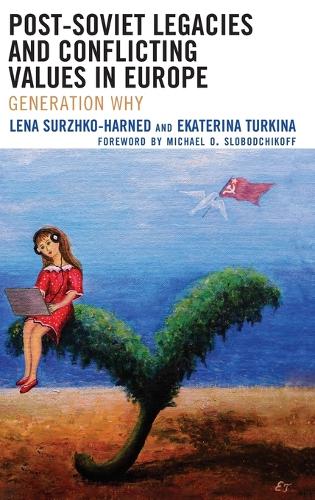
Post-Soviet Legacies and Conflicting Values in Europe: Generation Why
(Hardback)
Publishing Details
Post-Soviet Legacies and Conflicting Values in Europe: Generation Why
By (Author) Lena Surzhko-Harned
By (author) Ekaterina Turkina
Foreword by Michael O. Slobodchikoff
Bloomsbury Publishing PLC
Lexington Books
22nd November 2017
United States
Classifications
Professional and Scholarly
Non Fiction
303.372094
Physical Properties
Hardback
170
Width 162mm, Height 237mm, Spine 18mm
390g
Description
Generational conflicts occur in any society and prove to be both a puzzle and a rite of passage for every generation. Older generations often find it difficult to relate to the younger generations. Yet, as every generation comes of age, it leaves an impact on societal structures as a whole. Between baby boomers and millennials, societal norms and values transform in new and unexpected ways. While globalization has greatly contributed to the generational gaps world over, the post-communist transition, which occurred in the wake of the collapse of the USSR, left lasting and profound effects on these transitioning societies. This book investigates the generational conflict in the post-Soviet societies and argues that the generational divide runs deep. The post-Soviet generation, Generation WhY, has not dealt with the experience of old Soviet structures and they do not share the same values and norms as their parents and grandparents. Individualism, lack of trust in state institutions, independence, and entrepreneurial spirit run high among the members of the perestroika generation. Yet we still find differences between societies. While the Russian-Ukrainian conflict has its roots in a number of deeply seeded issues, this analysis shows that the generational gap is a part of the problem. This book also offers conclusive evidence to suggest that the members of the post-Soviet generation can be part of the solution.
Reviews
This is a masterfully executed study of political culture and behavior that reads like a novel. Surzhko-Harned and Turkina focus on the profound inter-generational change of values caused by the transition from communism in Russia and Ukraine, to provide nuanced, insightful, and multi-dimensional explanations for developments inside the two countries, their relations with each other, and their interactions with the European Union. -- Kostas Kourtikakis, University of Illinois at Urbana-Champaign
In this book, Lena Surzhko-Harned and Ekaterina Turkina address changing values of the new generation in the space of transition states, one of the most critical challenges facing post-Soviet countries. The research demonstrates the extensive implications of the growing and potentially fluid issue of cultural values and European integration of the post-Communist states. Authors provide a tremendous analysis of the Russia-Ukrainian conflict, European integration, and Russia-EU tensions, exploiting transitional experience of generations on the post-Soviet space. This is a timely addition to the growing literature on values transition in general and Post-Communist studies in particular. -- Oxana Karnaukhova, Southern Federal University
Throughout history, the destruction of states, conflicts, and wars have always rapidly transformed identities, and within the space of only a quarter of a century, Generation WhY in Russia and Ukraine have felt the end of Soviet power, two color revolutions, and war between their countries. This is a lucid and important book that is the first to methodically analyze the impact of these transformative developments on the identities of Russian and Ukrainian Generation WhY, how they began to diverge long before the 2014 crisis and why this will further deepen the differences between them and their parents Soviet generation. Stalin invented the concept of Russian-Ukrainian brotherly peoples, Putin buried it and Generation WhY will have to live in and with the brave new world they have inherited. -- Taras Kuzio, Johns Hopkins University
The book is an impressive scientific endeavor offering a thorough and rigorous analysis of how values persist and change in post-Socialist societiesboth across generations and countries. The insights of the book could be of tremendous help in understanding the failures and successes of post-Socialist transition and the conflicts within and across post-Soviet statesa must read for political scientists and sociologists with a focus on the post-Socialist region! -- Alexander Libman, LMU Mnchen
Author Bio
Lena Surzhko-Harned is assistant teaching professor of comparative politics at Penn State University. Ekaterina Turkina is associate professor in the Department of International Business at HEC Montreal.
